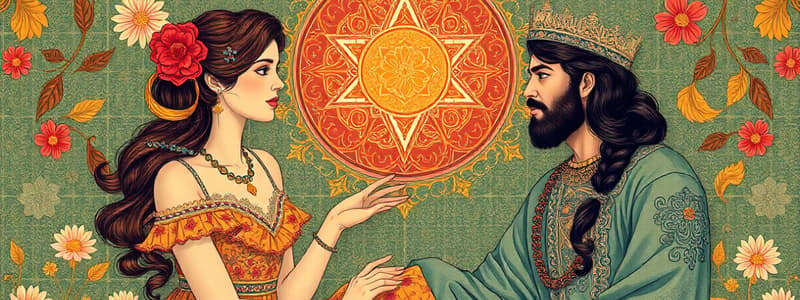Podcast
Questions and Answers
What is a significant reason for the importance of values in understanding culture according to the content?
What is a significant reason for the importance of values in understanding culture according to the content?
- Values are only relevant in Western cultures.
- Values provide a superficial view of societal interactions.
- Values are always aligned with modern behaviors.
- Values represent deeply rooted beliefs that influence behavior. (correct)
Which of the following best describes the limitation of typical observations made by managers about cultural differences?
Which of the following best describes the limitation of typical observations made by managers about cultural differences?
- They frequently overlook deeper socio-cultural patterns. (correct)
- They reflect an understanding of multi-country studies.
- They are often based on extensive academic research.
- They provide accurate and comprehensive insights.
What role do systematic research studies play in understanding cultural differences?
What role do systematic research studies play in understanding cultural differences?
- They generate insights about cultural differences based on objective analysis. (correct)
- They focus primarily on individual behaviors rather than group dynamics.
- They are primarily concerned with historical cultural data.
- They confirm all common stereotypes about cultures.
Which cultural value contrasts with individual privacy in the context provided?
Which cultural value contrasts with individual privacy in the context provided?
How is culture expressed according to the content?
How is culture expressed according to the content?
Which dimension of culture measures the degree of tolerance for unpredictability in a society?
Which dimension of culture measures the degree of tolerance for unpredictability in a society?
How do individuals in collectivist cultures primarily define their self-identity?
How do individuals in collectivist cultures primarily define their self-identity?
In Hofstede's dimensions of culture, what does 'power distance' particularly refer to?
In Hofstede's dimensions of culture, what does 'power distance' particularly refer to?
What is cultural distance primarily concerned with?
What is cultural distance primarily concerned with?
What characterizes individuals in individualistic cultures?
What characterizes individuals in individualistic cultures?
Which of the following countries is classified as individualistic?
Which of the following countries is classified as individualistic?
Which cultures are likely to suppress emotional expression?
Which cultures are likely to suppress emotional expression?
In which type of culture is it more common for personal and public lives to overlap?
In which type of culture is it more common for personal and public lives to overlap?
What primarily determines status in an achievement culture?
What primarily determines status in an achievement culture?
Which of the following cultures is characterized by a linear view of time?
Which of the following cultures is characterized by a linear view of time?
In ascription cultures, what factor is often the basis for an individual's status?
In ascription cultures, what factor is often the basis for an individual's status?
Which of the following represents an internal direction attitude in environmental dimension?
Which of the following represents an internal direction attitude in environmental dimension?
What characteristic is primarily associated with the male orientation in the context of masculinity-femininity?
What characteristic is primarily associated with the male orientation in the context of masculinity-femininity?
Which dimension represents a cultural focus on future-oriented values?
Which dimension represents a cultural focus on future-oriented values?
What is a characteristic of indulgent societies as defined in the context?
What is a characteristic of indulgent societies as defined in the context?
Which value orientation from the Schwartz Value Survey emphasizes moral equality among individuals?
Which value orientation from the Schwartz Value Survey emphasizes moral equality among individuals?
In Trompenaars' dimensions, what does universalism assert?
In Trompenaars' dimensions, what does universalism assert?
Which of the following is NOT a characteristic associated with restraint in cultural orientation?
Which of the following is NOT a characteristic associated with restraint in cultural orientation?
Which value orientation from the Schwartz Value Survey involves the pursuit of positive experiences?
Which value orientation from the Schwartz Value Survey involves the pursuit of positive experiences?
What is a defining aspect of particularist cultures according to Trompenaars?
What is a defining aspect of particularist cultures according to Trompenaars?
Flashcards
Culture
Culture
The complex interactions of values, attitudes, and behavioral assumptions that shape how a society functions.
Values
Values
Deeply held beliefs and principles that guide a person's behavior and actions.
Cross-cultural research
Cross-cultural research
The systematic study of cultural differences, using objective research to understand how these differences manifest in behavior.
Value analysis
Value analysis
Signup and view all the flashcards
Privacy vs. Collective well-being
Privacy vs. Collective well-being
Signup and view all the flashcards
Individualism
Individualism
Signup and view all the flashcards
Collectivism
Collectivism
Signup and view all the flashcards
Power Distance
Power Distance
Signup and view all the flashcards
Uncertainty Avoidance
Uncertainty Avoidance
Signup and view all the flashcards
Cultural Distance
Cultural Distance
Signup and view all the flashcards
Long-term orientation
Long-term orientation
Signup and view all the flashcards
Indulgence
Indulgence
Signup and view all the flashcards
Restraint
Restraint
Signup and view all the flashcards
Egalitarianism
Egalitarianism
Signup and view all the flashcards
Harmony
Harmony
Signup and view all the flashcards
Embeddedness
Embeddedness
Signup and view all the flashcards
Hierarchy
Hierarchy
Signup and view all the flashcards
Universalism versus Particularism
Universalism versus Particularism
Signup and view all the flashcards
Individualism vs. Collectivism
Individualism vs. Collectivism
Signup and view all the flashcards
Neutral vs. Affective Cultures
Neutral vs. Affective Cultures
Signup and view all the flashcards
Specific vs. Diffuse Cultures
Specific vs. Diffuse Cultures
Signup and view all the flashcards
Achievement vs. Ascription
Achievement vs. Ascription
Signup and view all the flashcards
Linear vs. Holistic Time Orientation
Linear vs. Holistic Time Orientation
Signup and view all the flashcards
Internal vs. External Direction
Internal vs. External Direction
Signup and view all the flashcards
Locus of Control
Locus of Control
Signup and view all the flashcards
Study Notes
Culture and its impact on Management
- Culture is expressed through values, attitudes, and behavioral assumptions within a society.
- These cultural beliefs are essential for members of a society and managers to understand.
- Values are deeply rooted and anchored in centuries of traditions and beliefs.
- Cultural differences can be studied systematically through cross-cultural research.
- Research reveals more than surface observations, looking at consistent patterns and assumptions.
- Cultural distance highlights difficulties in understanding between societal groups with differing values.
- Culture influences individual mental representations and shapes behavior.
Broad Cultural Concepts
- Individualism: Individuals are loosely linked, prioritize personal growth, and independence.
- Collectivism: Individuals are closely linked, prioritize collective goals, and duties.
Frameworks for Understanding Culture
- Kluckhohn and Strodtbeck Framework: Examines 6 problems all societies face with 3 alternative ways to handle them. These include environmental/relationship with nature, time orientation (past, present, future), activity orientation, concept of space, etc.
- Hofstede's Study: Identifies 4 dimensions of culture: individualism-collectivism, power distance, uncertainty avoidance, and masculinity-femininity.
- Trompenaars Dimensions: Examines 5 dimensions regarding relationships among people: universalism-particularism, individualism-collectivism, neutral-affective, specific-diffuse, and achievement-ascription
- GLOBE Study: Examines 9 dimensions, looking at organizational practices and their relationship with in-group collectivism, power distance, gender egalitarianism, assertiveness, etc.
Additional Concepts
- Cultural Distance: The difference in values between two groups.
- Cultural Tightness/Looseness: Tight cultures have strict norms, while loose cultures are more tolerant.
- Cultural Complexity: The amount of difference in individuals' lives within a society.
- Individualism/Collectivism: Refers to the societal tendency of individuals to prioritize themselves versus their group.
- Vertical/Horizontal Cultures: Refers to the emphasis placed on social hierarchies (vertical) or equality (horizontal).
- Time orientations: Linear (past, present, future) or holistic perspective of time.
- Environment: Internal vs. External. Internal cultures believe individuals are the primary influencers of their life, whereas external cultures see the environment as a greater influencer.
Studying That Suits You
Use AI to generate personalized quizzes and flashcards to suit your learning preferences.
Related Documents
Description
Test your understanding of cultural values and their significance in defining identity and behavior across various societies. This quiz covers major theories, including Hofstede's dimensions, and explores the contrast between individualistic and collectivist cultures. Assess your knowledge on how culture shapes human interactions and perceptions.



